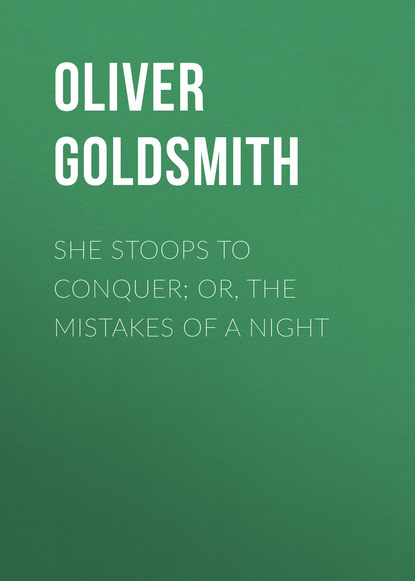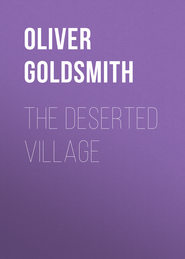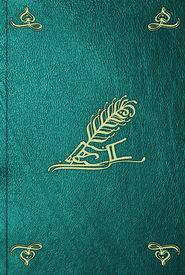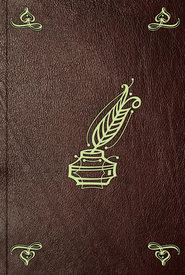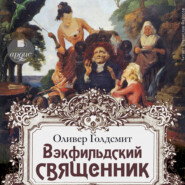По всем вопросам обращайтесь на: info@litportal.ru
(©) 2003-2024.
✖
She Stoops to Conquer; Or, The Mistakes of a Night
Настройки чтения
Размер шрифта
Высота строк
Поля
HARDCASTLE. (Aside.) I begin to lose my patience.
JEREMY. Please your honour, liberty and Fleet-street for ever! Though I'm but a servant, I'm as good as another man. I'll drink for no man before supper, sir, damme! Good liquor will sit upon a good supper, but a good supper will not sit upon – hiccup – on my conscience, sir.
MARLOW. You see, my old friend, the fellow is as drunk as he can possibly be. I don't know what you'd have more, unless you'd have the poor devil soused in a beer-barrel.
HARDCASTLE. Zounds! he'll drive me distracted, if I contain myself any longer. Mr. Marlow – Sir; I have submitted to your insolence for more than four hours, and I see no likelihood of its coming to an end. I'm now resolved to be master here, sir; and I desire that you and your drunken pack may leave my house directly.
MARLOW. Leave your house! – Sure you jest, my good friend! What? when I'm doing what I can to please you.
HARDCASTLE. I tell you, sir, you don't please me; so I desire you'll leave my house.
MARLOW. Sure you cannot be serious? At this time o' night, and such a night? You only mean to banter me.
HARDCASTLE. I tell you, sir, I'm serious! and now that my passions are roused, I say this house is mine, sir; this house is mine, and I command you to leave it directly.
MARLOW. Ha! ha! ha! A puddle in a storm. I shan't stir a step, I assure you. (In a serious tone.) This your house, fellow! It's my house. This is my house. Mine, while I choose to stay. What right have you to bid me leave this house, sir? I never met with such impudence, curse me; never in my whole life before.
HARDCASTLE. Nor I, confound me if ever I did. To come to my house, to call for what he likes, to turn me out of my own chair, to insult the family, to order his servants to get drunk, and then to tell me, "This house is mine, sir." By all that's impudent, it makes me laugh. Ha! ha! ha! Pray, sir (bantering), as you take the house, what think you of taking the rest of the furniture? There's a pair of silver candlesticks, and there's a fire-screen, and here's a pair of brazen-nosed bellows; perhaps you may take a fancy to them?
MARLOW. Bring me your bill, sir; bring me your bill, and let's make no more words about it.
HARDCASTLE. There are a set of prints, too. What think you of the Rake's Progress, for your own apartment?
MARLOW. Bring me your bill, I say; and I'll leave you and your infernal house directly.
HARDCASTLE. Then there's a mahogany table that you may see your own face in.
MARLOW. My bill, I say.
HARDCASTLE. I had forgot the great chair for your own particular slumbers, after a hearty meal.
MARLOW. Zounds! bring me my bill, I say, and let's hear no more on't.
HARDCASTLE. Young man, young man, from your father's letter to me, I was taught to expect a well-bred modest man as a visitor here, but now I find him no better than a coxcomb and a bully; but he will be down here presently, and shall hear more of it. [Exit.]
MARLOW. How's this? Sure I have not mistaken the house. Everything looks like an inn. The servants cry, coming; the attendance is awkward; the bar-maid, too, to attend us. But she's here, and will further inform me. Whither so fast, child? A word with you.
Enter MISS HARDCASTLE.
MISS HARDCASTLE. Let it be short, then. I'm in a hurry. (Aside.) I believe be begins to find out his mistake. But it's too soon quite to undeceive him.
MARLOW. Pray, child, answer me one question. What are you, and what may your business in this house be?
MISS HARDCASTLE. A relation of the family, sir.
MARLOW. What, a poor relation.
MISS HARDCASTLE. Yes, sir. A poor relation, appointed to keep the keys, and to see that the guests want nothing in my power to give them.
MARLOW. That is, you act as the bar-maid of this inn.
MISS HARDCASTLE. Inn! O law – what brought that in your head? One of the best families in the country keep an inn – Ha! ha! ha! old Mr. Hardcastle's house an inn!
MARLOW. Mr. Hardcastle's house! Is this Mr. Hardcastle's house, child?
MISS HARDCASTLE. Ay, sure! Whose else should it be?
MARLOW. So then, all's out, and I have been damnably imposed on. O, confound my stupid head, I shall be laughed at over the whole town. I shall be stuck up in caricatura in all the print-shops. The DULLISSIMO MACCARONI. To mistake this house of all others for an inn, and my father's old friend for an innkeeper! What a swaggering puppy must he take me for! What a silly puppy do I find myself! There again, may I be hanged, my dear, but I mistook you for the bar-maid.
MISS HARDCASTLE. Dear me! dear me! I'm sure there's nothing in my BEHAVIOUR to put me on a level with one of that stamp.
MARLOW. Nothing, my dear, nothing. But I was in for a list of blunders, and could not help making you a subscriber. My stupidity saw everything the wrong way. I mistook your assiduity for assurance, and your simplicity for allurement. But it's over. This house I no more show MY face in.
MISS HARDCASTLE. I hope, sir, I have done nothing to disoblige you. I'm sure I should be sorry to affront any gentleman who has been so polite, and said so many civil things to me. I'm sure I should be sorry (pretending to cry) if he left the family upon my account. I'm sure I should be sorry if people said anything amiss, since I have no fortune but my character.
MARLOW. (Aside.) By Heaven! she weeps. This is the first mark of tenderness I ever had from a modest woman, and it touches me. (To her.) Excuse me, my lovely girl; you are the only part of the family I leave with reluctance. But to be plain with you, the difference of our birth, fortune, and education, makes an honourable connexion impossible; and I can never harbour a thought of seducing simplicity that trusted in my honour, of bringing ruin upon one whose only fault was being too lovely.
MISS HARDCASTLE. (Aside.) Generous man! I now begin to admire him. (To him.) But I am sure my family is as good as Miss Hardcastle's; and though I'm poor, that's no great misfortune to a contented mind; and, until this moment, I never thought that it was bad to want fortune.
MARLOW. And why now, my pretty simplicity?
MISS HARDCASTLE. Because it puts me at a distance from one that, if I had a thousand pounds, I would give it all to.
MARLOW. (Aside.) This simplicity bewitches me, so that if I stay, I'm undone. I must make one bold effort, and leave her. (To her.) Your partiality in my favour, my dear, touches me most sensibly: and were I to live for myself alone, I could easily fix my choice. But I owe too much to the opinion of the world, too much to the authority of a father; so that – I can scarcely speak it – it affects me. Farewell. [Exit.]
MISS HARDCASTLE. I never knew half his merit till now. He shall not go, if I have power or art to detain him. I'll still preserve the character in which I STOOPED TO CONQUER; but will undeceive my papa, who perhaps may laugh him out of his resolution. [Exit.]
Enter Tony and MISS NEVILLE.
TONY. Ay, you may steal for yourselves the next time. I have done my duty. She has got the jewels again, that's a sure thing; but she believes it was all a mistake of the servants.
MISS NEVILLE. But, my dear cousin, sure you won't forsake us in this distress? If she in the least suspects that I am going off, I shall certainly be locked up, or sent to my aunt Pedigree's, which is ten times worse.
TONY. To be sure, aunts of all kinds are damned bad things. But what can I do? I have got you a pair of horses that will fly like Whistle-jacket; and I'm sure you can't say but I have courted you nicely before her face. Here she comes, we must court a bit or two more, for fear she should suspect us. [They retire, and seem to fondle.]
Enter MRS. HARDCASTLE.
MRS. HARDCASTLE. Well, I was greatly fluttered, to be sure. But my son tells me it was all a mistake of the servants. I shan't be easy, however, till they are fairly married, and then let her keep her own fortune. But what do I see? fondling together, as I'm alive. I never saw Tony so sprightly before. Ah! have I caught you, my pretty doves? What, billing, exchanging stolen glances and broken murmurs? Ah!
TONY. As for murmurs, mother, we grumble a little now and then, to be sure. But there's no love lost between us.
MRS. HARDCASTLE. A mere sprinkling, Tony, upon the flame, only to make it burn brighter.
MISS NEVILLE. Cousin Tony promises to give us more of his company at home. Indeed, he shan't leave us any more. It won't leave us, cousin Tony, will it?
TONY. O! it's a pretty creature. No, I'd sooner leave my horse in a pound, than leave you when you smile upon one so. Your laugh makes you so becoming.
MISS NEVILLE. Agreeable cousin! Who can help admiring that natural humour, that pleasant, broad, red, thoughtless (patting his cheek) – ah! it's a bold face.





